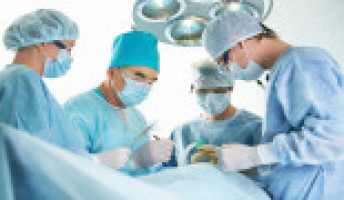
A lymph node collection kit can help surgeons attain compete resection and improve long-term survival after curative-intent lung cancer surgery, according to a study published in the Journal of Thoracic Oncology Clinical and Research Reports.
The journal is published by the International Association for the Study of Lung Cancer.
Surgical resection is the most important curative treatment for non-small cell lung cancer (NSCLC).
With successful implementation of lung cancer screening programs, the proportion of patients with NSCLC who undergo surgery is likely to increase significantly.
"However, poor surgical quality reduces the survival benefit of curative-intent surgery and suboptimal pathologic nodal evaluation is the most prevalent NSCLC surgery quality deficit. The problem is global, and prevalent across institutions of different characteristics," said co-author Matthew Smeltzer, PhD, University of Memphis School of Public Health, Memphis, Tenn.
The IASLC has proposed a revision of the residual disease (R-factor) classification, from complete (R0), microscopic incomplete (R1) and grossly incomplete (R2) to R0, 'R-uncertain', R1 and R2.
The adverse prognostic impact of R-uncertainty has been independently validated, with the majority caused by poor nodal evaluation.
"We previously demonstrated longer survival after surgical resection with a lymph node specimen collection kit, published in the Journal of Thoracic Oncology in February, and now evaluate R-factor redistribution as the mechanism of its survival benefit," Dr. Smeltzer said.
The kit includes 12 anatomically pre-labelled specimen containers and a checklist to indicate certain lymph node stations mandated for examination.
"We designed it to improve the intraoperative retrieval of lymph nodes compatible with evidence-based guidelines, the secure transfer of lymph node specimens between surgery and pathology teams, and the accurate identification of the anatomic provenance of lymph node specimens to encourage thorough and accurate pathologic evaluation," he said.
An ongoing NIH-funded population-based Dissemination and Implementation project (2 R01 CA172253), the Mid-South Quality of Surgical Resection (MSQSR) project involves 15 hospitals in Eastern Arkansas, North and Central Mississippi and Western Tennessee.
The principal investigator, Ray Osarogiagbon, MD, of Baptist Memorial Health Care Corporation in Memphis, Tenn., is a member of the IASLC's Staging and Prognostic Factors Committee.
In this particular analysis, Dr. Smeltzer and his co-researchers analysed 3,505 lung resections between 2009-2019 from the MSQSR cohort.
Of 3,505 resections, 34% were R0, 60% R-uncertain, and 6% R1/2.
The R0 percentage increased from 9% in 2009 to 56% in 2019. Kit cases were 66% R0 and 29% R-uncertain, compared to 14% R0 and 79% R-uncertain in non-kit cases (p < 0.0001).
"Compared to non-kit resections, kit resections had 12.6 times the adjusted odds of R0 vs. R0 uncertain," Dr. Smeltzer reported.
Kit cases also had lower percentages of non-examination of lymph nodes (ie. pNX), 1% vs. 14% (p < 0.0001) and non-examination of mediastinal lymph nodes, 8% vs. 35% (p < 0.0001).
With the kit, more R-uncertain cases had examination of stations 7 (43% vs. 22%, p < 0.0001) and 10 (67% vs. 45%, p < 0.0001).
The adjusted hazard ratio (aHR) for kit cases versus non-kit cases was 0.75 ([CI 0.66-0.85], p < 0.0001); aHR for R0 versus R-uncertain was 0.78 ([CI: 0.69-0.88], p < 0.0001).
In 2,100 subjects with R-uncertain resections, kit cases had an aHR of 0.79 versus non-kit cases ([CI: 0.64-80.99], p = 0.0384); however, in the 1,199 R0 resections the survival difference was not significant (aHR: 0.85[0.68-1.07], p = 0.17).
Dr. Smeltzer pointed out that a more carefully controlled trial is planned to corroborate these results.
"Ultimately, the main limitation of this study is that it was not a randomised controlled trial. We propose to conduct such a trial to further evaluate the lymph node kit," he said.
Source: International Association for the Study of Lung Cancer